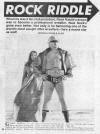I
remember a very special day when the family actually drove over
twenty miles from home to the “big-city” airport in Greensboro. I
was in “junior high school.” We watched a DC-9 passenger jet take
off. My grandfather had never seen a large aircraft. He said, “At
thang’s huge. How many people ya thank er on et plane?” My father,
who had fought in World War II and was therefore more aware of such
things, spoke “Yes,” I thought. “I have everything I could possibly want right here – as long as I want to become a tobacco farmer or work on a looper machine making socks for Burlington Mills. No, thank you!” I knew all of my life that I wanted more, but I didn’t know what direction my life would take until I was introduced, at the age of fourteen, to the wonderful world of professional wrestling. By sixteen years of age, I had a dream. I had passion. Even though I was a somewhat frail 135-pound boy, I knew that my dream would come true. I knew that I would be a professional wrestler before my twenty-first birthday. I was correct. My first professional wrestling match took place when I was twenty years of age. I exceeded my goals, and I lived my dreams as a full-time professional wrestler for over eight and a half years. I was paid very well in a profession that I would have gladly done for free. In fact, if necessary, I would have paid to be able to wrestle. That’s how much I loved the business. Quite often I run into people who tell me that they hate their jobs. I look directly into their eyes and emphatically say, “Then do something else!” Life is much too short to do anything other than what you love. Most people seem to think that their dreams are only “wishful thinking,” fantasies that will never be realized. I have always enjoyed a different viewpoint. I’ve known since I was a small child that dreams are previews of what we can have if we accept them and work toward them -- and, of course, if we don’t allow the “dream stealers” to rob us of our potential futures. Actually, no one can take your dreams from you without your permission. I lived
my dreams by attaining my goals – and going beyond – in the world of
professional wrestling. While living those dreams, I was open to The money was very good in the AWA, and, again, the talent was absolutely world-class. The only real challenges there were the trips; they were very long. Trips of over four hundred miles were not uncommon. I would drive eight to ten hours to reach a town, wrestle, and then drive another eight to ten hours back. Four or five of these trips per week, week after week, began to take their toll. The top main-event guys were traveling more than those of us who were working mid-card.
After hearing complaints for months about the amount of time the wrestlers spent on the road, promoter Verne Gagne bought a twin-engine Piper Navajo aircraft and hired a pilot to fly the top guys from town to town. Since I was wrestling mid-card (usually the second or third match out of five) I wasn’t one of the fortunate few who were flown from town to town. That is, until after a certain opportune situation occurred. I was in the dressing room when I overheard Baron von Raschke and several of the other top stars talking. They vowed to never fly in Gagne’s plane again. The way they told it was that the aircraft had lost an engine in flight and that there were several thousand feet of altitude lost before the inept pilot got it restarted. They refused to fly again. There were only a couple of the guys who were still willing to fly. “This is great!” I thought. “Now, maybe I can fly to some of the matches!” I looked at Baron von Raschke. “Are they still flying to Greenbay tomorrow night?” “Ya, da are,” was the Baron’s response. “I’ll fly there,” I said. Baron reached out and shook my hand, saying, “Nice knowing you, Rock.”
|
|||||||||||||
|
This column welcomes your wrestling-related
questions. You may contact the author via email: RockRiddle@hotmail.com
or
Rock@HollywoodSuccess.com.
Be sure to put "Wrestling Question" in the subject line.
© 2007 Rock Riddle & Hollywood Success. |
|||||||||||||
| Previous Column | Wrestling Revue Home Page | Next Column | |||||||||||
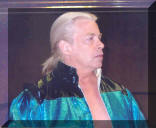
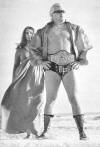
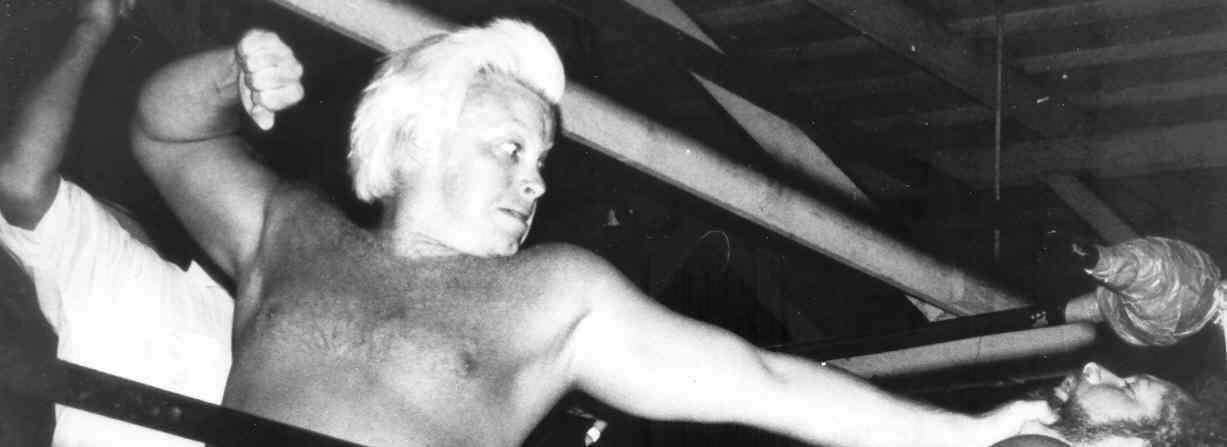


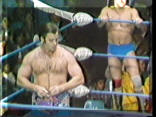
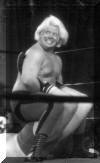
 I
spent the first seventeen years of my life in the small town of
Burlington, North Carolina. Everyone I knew during that time had
been born there. Their
I
spent the first seventeen years of my life in the small town of
Burlington, North Carolina. Everyone I knew during that time had
been born there. Their  up. “Ere’s over a hun-derd passengers on et un rite dere.” “Naw,”
my grandfather replied in disbelief. “Whir er all em people a-goin?”
he asked. “That one’s going to California,” I chimed in, smiling
that I knew the answer. Granddad had a totally perplexed look on
his face when he said, “Why in th’world wud et many people wonna
gota California?” He couldn’t grasp the concept that over a hundred
people would be on an aircraft heading for the West Coast. I
refrained from telling him that there was more than one aircraft
leaving North Carolina for California and that it was happening
multiple times everyday. On the drive back to his “comfort zone” of
Burlington, he kept pondering the situation and shaking his head.
Finally, he summed up the small town thinking of my birthplace. “I
‘ownt understand why anybody’d wonna leave. Heck, ya got ever-thang
you could wont right ‘ere in th’county.”
up. “Ere’s over a hun-derd passengers on et un rite dere.” “Naw,”
my grandfather replied in disbelief. “Whir er all em people a-goin?”
he asked. “That one’s going to California,” I chimed in, smiling
that I knew the answer. Granddad had a totally perplexed look on
his face when he said, “Why in th’world wud et many people wonna
gota California?” He couldn’t grasp the concept that over a hundred
people would be on an aircraft heading for the West Coast. I
refrained from telling him that there was more than one aircraft
leaving North Carolina for California and that it was happening
multiple times everyday. On the drive back to his “comfort zone” of
Burlington, he kept pondering the situation and shaking his head.
Finally, he summed up the small town thinking of my birthplace. “I
‘ownt understand why anybody’d wonna leave. Heck, ya got ever-thang
you could wont right ‘ere in th’county.”

 The
next night, I met the pilot and asked him about the
“near-disaster.” “It was not a big deal,” he said, “I just waited a
little too long to switch to the second fuel tank.” “Well,” I
The
next night, I met the pilot and asked him about the
“near-disaster.” “It was not a big deal,” he said, “I just waited a
little too long to switch to the second fuel tank.” “Well,” I

